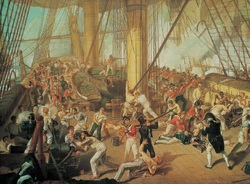
Nelson and his captain, Thomas Hardy, a good friend of his, were pacing the quarterdeck, with Nelson on the right. Suddenly, Nelson was sent stumbling forward and down onto his knees. He was struck in the left shoulder by a musket ball which pierced his left lung, fractured two ribs, severed the pulmonary artery and lodged in his spine, damaging his spinal cord. Nelson already he knew the wound was fatal. He tried to support himslef with his hand before his arm gaveway and he fell into a pool of blood left by his secretary.
Hardy rushed to his admiral's aid.
'The have done for me at last, Hardy.' 'I hope not,' Hardy responded. Nelson was certain.'Yes, my backbone is shot through'.
The horrified captain called over Sergeant James Seckar of the Royal Marines and a couple of seamen to carry Nelson to the cockpit. They carefully lifted the admiral up and began to slowly carry him down to the Orlop deck. Nelson was still fully conscious and on his way down noticed that the tiller ropes needed to be replaced, and told a midshipman to inform Hardy. He also had a hankerchief placed over his face and chest so that his men would not recognise him and be discouraged.
When they reached the cockpit, where the surgeon was operating on the wounded, he was alerted of Nelson's presense by calls of 'Mr Beatty, Lord Nelson is here' and 'Mr Beatty, the admiral is wounded' from some of the injured. He immediately came and Nelson laid down on a bed, stiped of his clothes and covered with a sheet. 'You can do nothing for me', Nelson said. Beatty, after a quick examination, could tell instantly that Nelson was going to die.
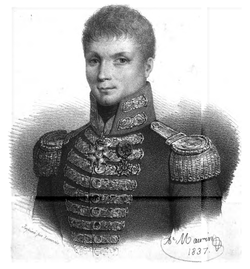
The captain of the Redoubtable, Jean Lucas (to the right), had used his time wisely
while in Cadiz, training up his men for the purpose of boarding. While Nelson
had been walking the deck, the Redoubtable had closed her gun ports and
Lucas's men were showering Victory's quarterdeck with musket fire. It was unlucky for Nelson that the Victory ended up alongside her.
However, the bullet which hit Nelson probably wasn't deliberatly aimed. The soldiers up in the Redoubtable's rigging and on the fighting tops would have a hard time seeing the Victory's quarterdeck. There was smoke everywhere, and rigging would have impaired their view. To add to that was the swell of the ship, which would have been much more noticable high up on the tops. Nelson was in all probability hit by a completely random shot.
It's been suggested in the past that Nelson had caused his own death. He had sown onto his coat fascimilies of his four orders of chivalry- an obvious target which seemed to say 'here I am, shoot me if you can!' Some people have even gone as far as arguing that Nelson had deliberately set out to be shot, enhanced by the fact that he had left his sword in his cabin, had refused to change his coat and refused to leave the Victory and witness the battle from one of his frigates.
However, it is very unlikely that his orders would have been made out at all. They were made of sequins but were certainly not shiney or sparkly. They were worn on his every day 'undress' coat, not, as popular legend would have it, on his showy full dress coat- and so were probably quite worn and dull. It's very unlikely that they played a role in his death at all.
And let's not forget, Nelson was really not the suicidal type. Sure, he had his depressive moments, but now was not one of them, and he seemed happy and content with his life. Infact, he had everything to live for. He probably simply forgot to put his sword on. Nelson was determinded to lead the line. It was his duty to do so, and it was important to set an example. Agreeing to hide away or change to a less vulnerable ship went against everything that was important to him.
Nelson was always prepared for his death in battle, and fully acknowledged the possiblity of it. On the morning of Trafalgar, he had written down a prayer saying how he had resigned himself God.ever hoped to die, but was accepting of whatever his fate was.
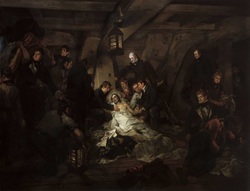
Nelson took it upon himself to prepare everyone for his death, saying, 'I can live but a short time'. Walter Burke, the ship's purser, and John Scott, the chaplain, were supporting him at a 45 degree angle, the most comfortable position for Nelson, fanning him, offering him drinks of lemonade, and rubbing his chest- doing everything they could to ease his pain and discomfort. They tried to remain optimistic, suggesting that the wound was not as bad as it seemed and that he would live to reap the rewards of his glorious victory. 'It is nonsense to suppose I can live,' Nelson replied, 'It is all over!'. 'I have to leave Lady Hamilton, and my adopted daughter Horatia, as a legacy to my country,' he said.
He wanted to see Hardy, and requested his presence several times. But he didn't come. Nelson fretted that Hardy 'must be killed'.
Eventually, over an hour after Nelson was hit, Hardy was free to visit his dying friend. He reported that the battle was going well. 'I am a dead man, Hardy. Pray let dear Lady hamilton have my hair, and all other things belonging to me,' Nelson begged. Hardy still hoped that Nelson would live yet, but Nelson said that it was 'impossible'. Hardy returned to the quarterdeck.
Nelson had Beatty, who had left at Nelson's command to attend to the others, called over again. 'Ah, Mr Beatty! I have sent for you to say, what I forgot to tell you before, that all power of motion below my breast are gone; and you very well know I can live but a short time.' Beatty finally admitted it. 'My Lord, unhappliy for our Country, nothing can be done for you.' 'I know it Nelson said, 'I can feel something rising in my breast which tells me I am gone.'
Nelson then turned his thoughts to Emma and his daughter. He described that the pain was so great that he wished he were already dead, but then added, 'yet one would like to live a little longer too. What will become of poor Lady hamilton?'
About fifty minutes after his previous visit, Hardy returned once more. He congratulated his admiral on his glorious victory, saying he was certin that fourteen or fifteen of the enemy were captured. 'That is well' Nelson replied, 'but I bargained for twenty.' Nelson then told Hardy to send a signal for the fleet to anchor- he knew a storm was coming- and asked Hardy not to throw his dead body overboard. 'Oh! No, certainly not!' Hardy promised. 'Then you know what to do. Take care of my Ladt Hamilton, Hardy, take care of my poor Lady Hamilton. Kiss me Hardy.'
It is without a doubt that Nelson did ask for a kiss from Hardy. It was recorded by three people. It was an embarrasing thought to the Victorians, but in Nelson's time it was not unusual for men to display affection for each other, and nobody there was embarrassed by it. And it must be remembered that Nelson was dying. Even for the bravest of men there must of been something a little unnevering about death now that he was on the brink of it. It is understandabke that he, always sentimental man, would ask for that one last symbol of affection from one of his dearest friends. Hardy obliged, kissing him first on the cheek, and then kissing him on the forehead. 'God bless you Hardy!' Nelson exclaimed. 'Now I am satisfied. Thank God I have done my duty.'
Hardy now left and Nelson was going quickly. His speech became faint and disjointed and he slipped in and out of consciouness. He asked to be turned over onto his right side and became very thirsty. 'Fan, fan... drink,drink' he called. 'Thank God I have done my duty,' he repeated.
After a few minutes of being silent, Beatty was sent for. He felt for a pulse but he could feel none. He placed his hand upon Nelson's forhead. Nelson opened his eyes and looked up one last time, before shutting them forever. Beatty returned to his work, and after another five mintutes, was called for again. He confirmed that Nelson had died, after about two and a half hours, at 4.30 pm.
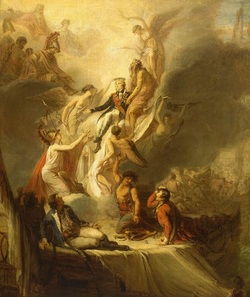
Nelson's hair was cut off and his body was placed in a cask of brandy. The crew of the Victory insisted that they be the ones to take his body home, rather than a faster frigate. When they returned to England, Beatty removed the ball, found with a piece of epaulette attached to it, and several of his organs. The heart was put back in. He noted that Nelson's organs were in very god condition, more like a young man's. It seemed that Nelson would have lived lived much longer if he hadn't been shot.
The body was wrapped in cotton bandages, and was placed in a coffin. The body wasn't preserved too well, and Beatty advised against an open casket funeral.
The funeral was massive and took place on 9 January 1806, after laying in state in the Painted Hall, Greenwich. He was buried in St. Paul's Cathedral, directly beneath the dome.
The manner of Nelson's death was what earnt him 'immortality'. People love it when someone dies doing their duty, and he did that right to the end.He expired in his finest hour. He never faded away like some heroes did, he remained solidly in the nation's heart, as Britain's greatest war hero.
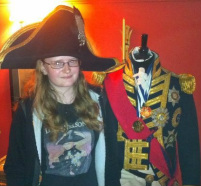
 RSS Feed
RSS Feed